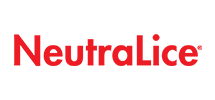Frequently Asked Questions
If you have any questions or feedback about NeutraLice feel free to contact us.
Head lice are tiny parasites which live on the human scalp and hair. They feed on blood several times a day and they cannot survive for more than 24 hours away from their human host.
Nits are not the same thing as head lice. They are the eggs that head lice lay. They are usually oval shaped and about the size of a grain of salt. They are fixed to the hair close to the scalp while head lice move around the scalp and hair.
No. Head lice are not fussy about cleanliness and are not an indication of cleanliness. All they want is a warm head and blood to feed on.
No, you can’t catch head lice from birds and animals. They are “host specific” and only live on humans.
Head lice can only live for about 4 to 5 weeks. Since the females lay eggs everyday and the eggs hatch in 7 to 10 days it may seem like they live for a long time.
The best way to tell is to do an inspection of the child’s head. You may see actual lice or tiny white or grey specks stuck to the hair usually found near the scalp. Children often complain of an itchy scalp but sometimes there are no symptoms.
Yes, they spread easily from one person to the next person. This may be through direct contact (heads touching) or indirect contact (sharing a hat or brush). Head lice can crawl onto objects like hats and brushes but they cannot fly or jump.
All the members of the household should be carefully inspected and treated if head lice or eggs are found. You should notify the parents of friends that your child has been in contact with so that they are on the lookout for an outbreak.
There is no treatment available that can kill 100% of the eggs in 1 treatment. The eggs hatch around 7 days after being laid. That is why more than 1 treatment is required to break the head lice cycle.
In general use, no product available can kill all eggs in 1 treatment. Unless all the eggs are removed there is a risk of some eggs hatching after a treatment. Retreatment 7 and 14 days after the first treatment is necessary to kill any head lice that have hatched from surviving eggs before they mature and lay more eggs, and to break the head lice cycle.
Removal of eggs can be difficult as the eggs are attached to the hair with a glue-like substance. Eggs are difficult to comb out of the hair and don’t just fall out after a treatment. NeutraLice Conditioner Shampoo is a specially formulated hair cleanser for daily use to help remove the eggs. It helps break the bond between the eggs and the hair. This helps loosen the eggs, allowing them to be combed out more easily. Note that NeutraLice Conditioner Shampoo is not a treatment product and does not kill head lice.
No, you don’t have to purchase a special product. Head lice cannot survive away from the human scalp as they feed on human blood. Bedding and clothing should be washed in hot water and then dried in a hot dryer. Brushes and combs should be washed in hot water. Any items that are not washable like stuffed soft toys should be put in the dryer on a hot cycle or alternatively they can be sealed in a plastic bag for a few days.
While hair is still damp, start at the top of the head and lift a 2cm section of hair. Ensure the teeth of the comb are as deep into the hair as they can go and touching the scalp. Comb with a firm even motion away from the scalp to the end of the hair. Wipe eggs completely from the comb with a tissue. Continue process with each section of hair.
NeutraLice Lotion, Spray and Advance Kits contain a lice comb to help detect and remove eggs. Also available is the NeutraLice Nitcomb-M3, a metal comb. It has three rows of teeth which are fine and extra fine, and increases the effectiveness you get with a single row comb.
Always read the label and follow the directions for use.
Reference: 1. Barker and Altman: A randomised, assessor blind, parallel group comparative efficacy trial of three products for the treatment of head lice in children – melaleuca oil and lavender oil, pyrethrins and piperonyl butoxide, and a suffocation product. BMC Dermatology 2010 10:6. Research was funded by Key Pharmaceuticals.
